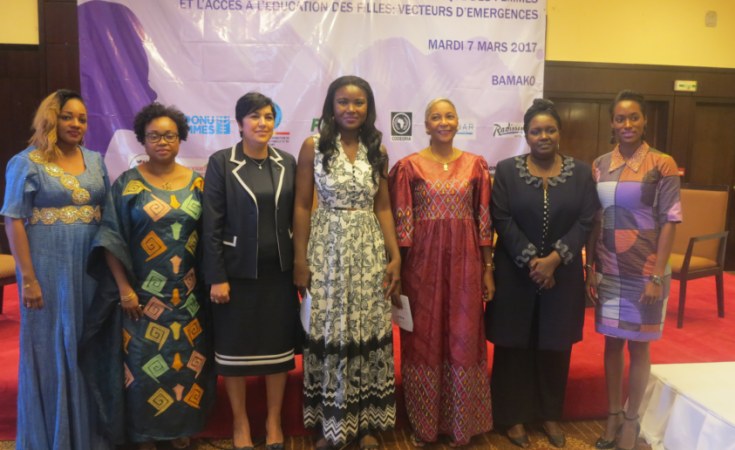Bamako — Does marriage hinder girls' education? This question has emerged from the panel entitled "They Inspire" organized by AllAfrica on Tuesday 7 March in Bamako, Mali. The event was co-hosted by the High-Level Working Group of the United Nations Secretary-General for Women's Economic Empowerment (UNHLP), as part of International Women's Day celebrations.
The marriage versus career debate was at the heart of the discussion session with women leaders from the fields of medicine, aeronautics, public administration and commerce and young women between the ages of 16 and 20 to guide and inspire their future plans. It was on the sidelines of a panel on "Women's Economic Empowerment and Girls' Access to School".
The young women in attendance questioned the panel of 2017 prize winners on whether it's possible to combine pursuing a tertiary education with the pressures of married life. This shows how difficult it is for young women to decide between social pressures and their ambition to continue their studies. "How can you continue your studies if you know that your parents can decide at any time that you should be married?", asked Oumou Keita, a young schoolgirl. Miss Oumou Waly, a young student at a Bamako training center, similarly asked: "How can one excel in your field while being married?".
Contrary to the skepticism of her sisters, Miss Aïssatou Diakité said it's essential to be courageous. A position echoed by all the women leaders on the panel.
Most panelists agreed that it is best to avoid getting married too young, so that they are able to continue their studies and forge a better future.
Mrs. Zineb El Adaoui, a governor of the city of Agadir in Morocco emphasised that marriage is not an end in itself and women should assert themselves and say no. In Morocco, the age of marriage is set at 18 to allow women to continue their studies.
The same goes for Dr. Awa Mbow Kane, diabetologist and endocrinologist and President of l'Association Action Citoyenne pour la Santé in Senegal. This recipient of the AllAfrica Leadership Prize for Women 2017 says that policies must focus on keeping girls in school and allowing them to go as far as a bachelor's degree.
Mrs. Mariam Diallo Drame, President of the Women, Leadership and Sustainable Development Association, says that poverty is pushing many families to marry off their daughters.
Girls should not accept any form of violence, according to Diallo Drame. "We must hold onto our values and culture while being open to the world," she said. She added that an intergenerational dialogue should be established to tackle these challenges as well as inviting girls to campaign for this cause.
Binta Diop, Special Envoy of the Chairperson of the African Union Commission for Women, Peace and Security told the young women that all the panelists were faced with trying to maintain the intricate balance between education, marriage and work but also advised them to never stop studying and continue to pursue the quest for knowledge. Mrs. Diop said that despite being 67-years-old she is currently pursuing a doctorate.
Fati Niang, President of Black Spoon, the first African Food Truck created in Europe in 2013, advises girls to think about what they want to do and engage in sectors they care about.
Similarly, Iréne Koki Mutungi, a pilot with Kenya Airways, encouraged girls to develop an interest in science and technology as it will open doors for them. Mrs. Mutungi regrets the fact that even though it has been 50 years since the first female pilot qualified only 3% of pilots, across the world, are women.
Ms Maiga Bineta Yatassaye who works an economist and serves as the President of the Board of Directors AGEROUTE in Mali, believes that "success begins with setting a goal". The AllAfrica Women's Leadership 2017 prize winner told the young students that success is a state of mind and that openness to one's environment is important.
Ms. Zineb El Adaoui Governor of the city of Agadir recommends that girls work by reflex and reflection, they should look for mentorship and should surround themselves with charismatic people.
Dr. Maxime Houinato, Resident Representative of UN Women in Mali, said adults should watch what they post on social media and warned parents not to think that once they send their children to school their task is done. They should take responsibility for their children.
Mr Houinato argues that young girls must benefit from the evolution of the law which gives women greater freedom.
This story was translated into English from the original French story.


